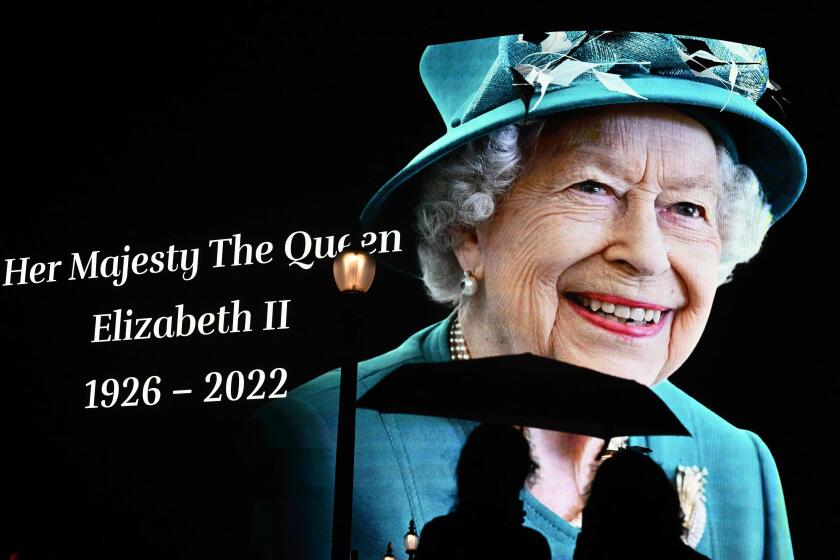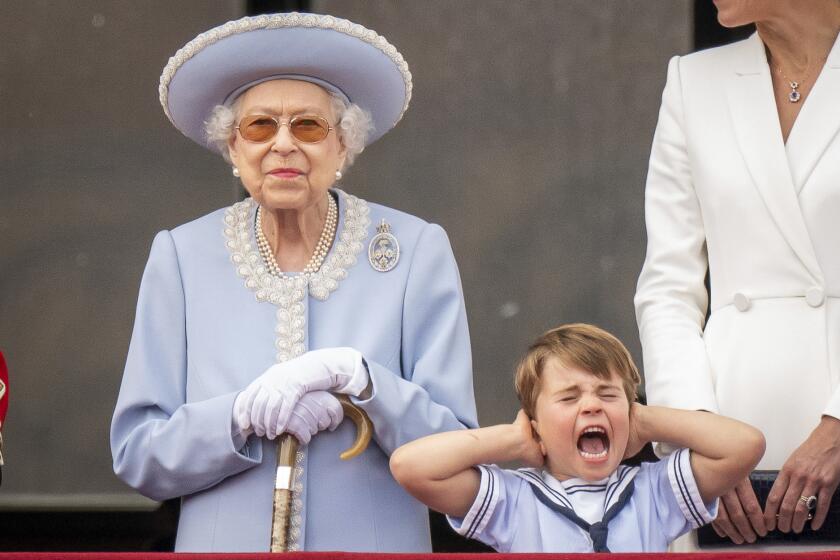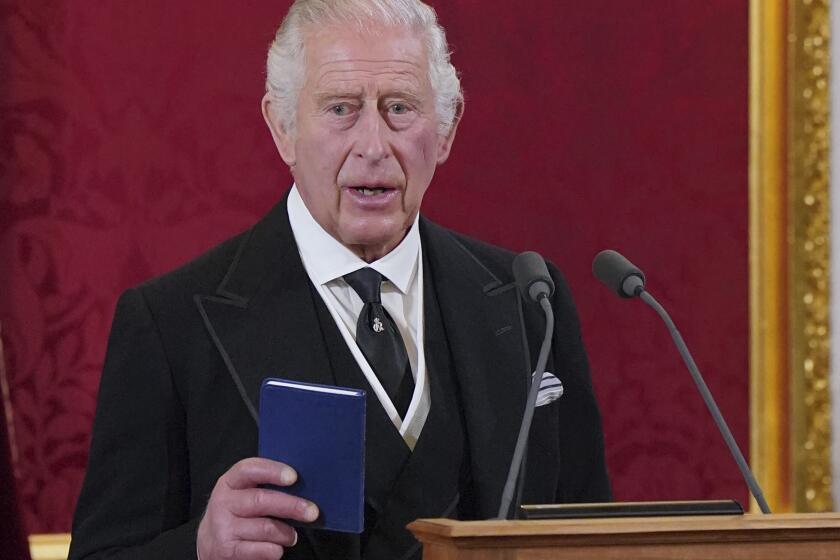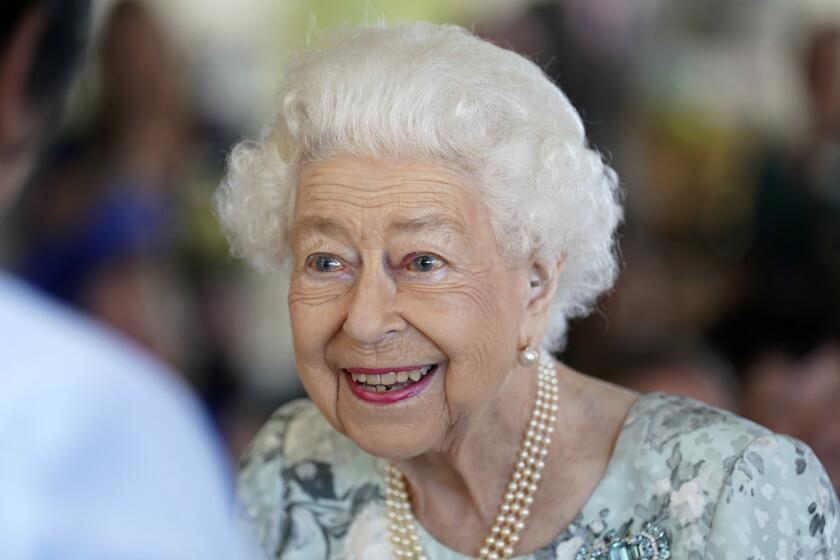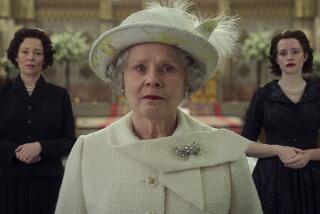Op-Ed: Her Majesty was a pretty nice queen, without a lot to say
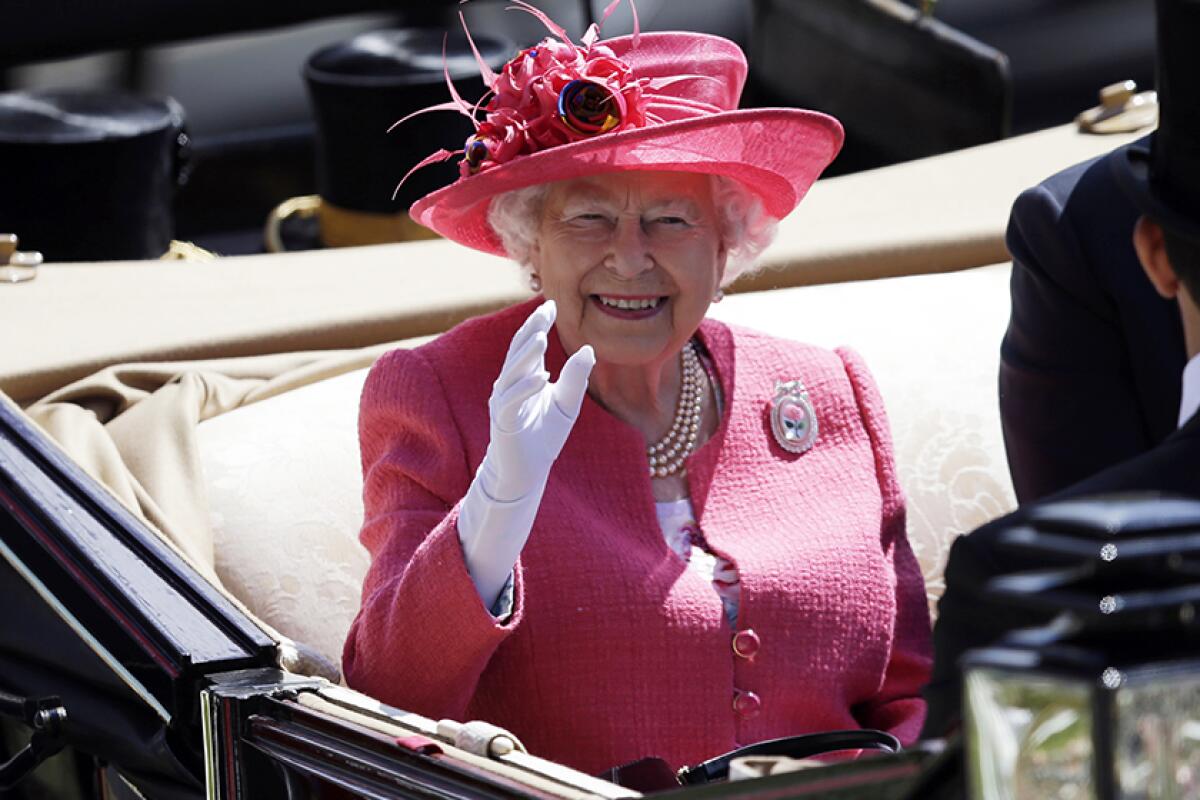
- Share via
If the British monarchy is to survive, it needs someone who is as bland as Queen Elizabeth II.
You would look in vain for any controversial statements made by the queen during her lifetime. Sure, in the internet age, she, too, acquiesced to having a Twitter account, and a team of press people would post things on Instagram in her name. But they were all bland, uncontroversial — and, frankly, dull.
In an age when everyone has an opinion — when everyone in public life feels an urge to tell all and sundry about their grumbles, gripes, and grievances — she never did. That is exactly why she — and the monarchy — became a stabilizing factor in a time of upheaval.
Take this anecdote from 1995, when Montreal broadcaster Pierre Brassard phoned Queen Elizabeth II at Buckingham Palace and convinced her that he was then-Canadian Prime Minister Jean Chrétien.
The Canadian politician was concerned that Quebec, the French-speaking province, would break away in a referendum in that year. And the imitator asked her to intervene. She did not. Nor did she deny the request. She just responded with studious dullness, and small talk. What would have been a scoop was nothing of the kind, because the queen said nothing of substance.
Queen Elizabeth II was the embodiment of the British Empire, which committed atrocities. But she also became a reassuring figure for the present.
In British constitutional theory, the role of the monarch is almost purely ceremonial. But not entirely. In 1867, the journalist Walter Bagehot wrote that the queen was part of the “ceremonial” part of the constitution, not the “functional.” The sovereign was no longer the ruler, but she maintained “the right to be consulted, the right to encourage, the right to warn,” he wrote in the book “The English Constitution.”
Paradoxically, the unelected monarch can have a democratic role to play. If she (now he) knows how to perform their duties.
Don’t get me wrong, the idea of a monarchy goes against every logical tenet of a meritocratic society. And yet, one could make the argument that the queen’s ability to give politicians advice was uniquely unpolitical and disinterested, since she had a long view and never had to face voters.
Queen Elizabeth’s whole life was based on duty and ritual. That didn’t stop her from taking a moment to chat up her antic great-grandson during her Platinum Jubilee.
When — on rare occasions — no party had a majority in the House of Commons, she could advise on who could form a government in a way that was not party political. Her reserve also gave the whole political sphere to elected officials; she, like the most understanding parent, would never criticize them in public, even if she might disagree in private.
By contrast, in countries with an elected head of state (like Finland, Italy or Germany) the president is almost inevitably a former politician. Only the most unopinionated presidents in European countries — notably ’90s Irish President Mary Robinson and the present Irish President Michael D. Higgins, a poet in his previous life — have managed to be accepted as neutral arbiters. More typically, there is a strong whiff of partisanship around Europe’s elected presidents, a sense that the advice they give to prime ministers or chancellors is tainted by past political allegiances.
Prince Harry and his wife, Meghan, the Duchess of Sussex, joined Prince William and Princess Kate at Windsor Castle to view floral tributes left by the public in honor of the queen.
This is not the case with a monarch. And in this, Queen Elizabeth was an unrivaled master, because she was, yes, bland.
Queen Elizabeth’s talent for not saying anything, maintaining the sense that she was above the fray made her a rallying point, a symbol of unity, for many in a divided society.
The big question for the British monarchy — and for the countries that still have her as the head of state (including Canada, New Zealand, Jamaica, and Canada) — now is whether her successor is capable of displaying the same talent.
Queen Elizabeth II’s 70-year reign was so long that most of Britain’s 68 million people have known no other sovereign.
King Charles III has a reputation for his strong, sometimes polarizing opinions on everything from architecture to the environment. But having opinions is no longer his job. Is he up to aloofness?
In a constitutional monarchy, once the monarch has an opinion, the support for the institution falls away. When Spanish King Felipe VI made remarks about Catalonia that indicated he was unsympathetic to the secessionist aspirations of some Catalans, it damaged the institution of the monarchy.
Charles must do his utmost to show that he is the king of all Britons. This is a difficult task — and an urgent one. The Scottish government is seeking a second independence referendum in 2023. And while Queen Elizabeth, who died at Balmoral, was highly popular in Scotland, only a minority of the Scottish people support the monarchy as an institution.
Of course, it may be inhuman for any flesh-and-blood monarch to match the mien of the most successful and studiously bland monarch in modern history. But politicians may find it worthwhile to try to imitate her.
Perhaps the late queen’s lasting lesson is that we still need the illusion of steady leaders onto which we can project our own complicated feelings.
Matt Qvortrup, a professor of political science at Coventry University in England, is currently a visiting professor of constitutional law at the Australian National University. He is co-editor of the book “Complementary Democracy: The Art of Deliberative Listening.” This article was produced in partnership with Zócalo Public Square.
More to Read
A cure for the common opinion
Get thought-provoking perspectives with our weekly newsletter.
You may occasionally receive promotional content from the Los Angeles Times.
